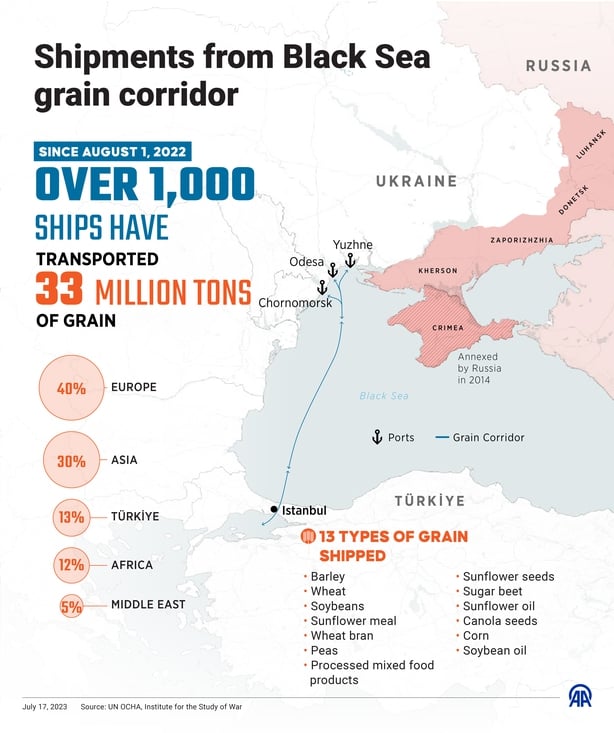Russia has refused to extend a deal to allow Ukrainian grain exports through the Black Sea, sparking outrage from the United Nations, which warned millions of the world's poorest would "pay the price".
Moscow's invasion last year saw Ukraine's Black Sea ports blocked by warships until the agreement - brokered by the UN and Turkey and signed in July 2022 - allowed for the passage of critical grain shipments.
The Kremlin yesterday said it was exiting the deal, after months of complaining that elements allowing the export of Russian food and fertilisers had not been honoured.
"The grain deal has ended. As soon as the Russian part (of the agreements) are fulfilled, the Russian side will immediately return," said Kremlin spokesman Dmitry Peskov.
UN Secretary General Antonio Guterres said Moscow's move would "strike a blow to people in need everywhere."
"Hundreds of millions of people face hunger and consumers are confronting a global cost-of-living crisis. They will pay the price," he told reporters.

Ukrainian President Volodymyr Zelensky said Ukraine was prepared to keep exporting grain via the Black Sea despite Russia's exit.
"We are not afraid. We have been approached by companies that own ships. They said that they are ready" to continue shipments, Mr Zelensky said.
Moscow's withdrawal could see Russian ships preventing grain exports by blockading Ukrainian ports, which occurred in the conflict's early months and helped drive up global food prices.
Ukrainian officials said early this morning it had activated aerial defences in the southern Odesa region, home to maritime terminals key to shipping the grain, after Russia launched "attack drones".
Over the last year, the Black Sea Grain Initiative has enabled the export in cargo of more than 32 million tonnes of Ukrainian grain.
Read more:
Latest Ukraine headlines
Explained: Why does the expiry of the Black Sea grain deal matter?
The UN said a final ship carrying Ukrainian grain through the Black Sea was inspected in Istanbul on Monday, a few hours before the deal expired.
Moscow's withdrawal from the deal came hours after drones struck the only bridge connecting Russia's mainland to the annexed Crimea peninsula, a key supply line for Russian forces in the south of Ukraine.
EU chief Ursula von der Leyen condemned Moscow's "cynical" decision, while US Secretary of State Antony Blinken said Russia's "unconscionable" action was "weaponising food".
Mr Guterres added that Russia's decision would not stop the United Nations' efforts to "facilitate the unimpeded access" to global markets of food and fertilisers from Ukraine and Russia.
According to data from the Joint Coordination Centre that had been overseeing the agreement, China and Turkey are the main beneficiaries of the grain shipments, as well as developed economies.
The deal has helped the UN World Food Programme bring relief to countries facing critical food shortages such as Afghanistan, Sudan and Yemen.
The news had a limited impact on international wheat prices, which are down by nearly a quarter from one year ago.
Mr Guterres had been working hard to get the deal renewed and supported removing hurdles to Russia exporting its fertilisers.

